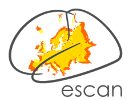
for Cognitive and
Affective Neuroscience
ESCAN-Social Neuroscience
Toward Dynamic Social Cognition and Affect:
The role of the Cerebellum and Neocortex
Preconference Program: 22 May 2024 Ghent
Theme:
Almost every social and affective neuroscience conference focusses on the neocortex and static aspects of social cognition and emotion. For too long, social neuroscience used and evaluated material depicting relative static social behaviors, with little regard for the rich dynamic nature of social action and emotional experiences. Dynamic analysis is important, because the brain is constantly trying to predict the physical and social world, in order to engage fluently in the next stage of social and non-social behavior. Increasing evidence points to the importance of the cerebellum in dynamic social and affective functions. Dynamic analysis is also important because social and emotional behaviors often involve human interaction, with give and take from both parties, with is impossible without anticipating what is coming next and making quick corrective social and emotional adaptations if expectations are not met. Without the cerebellum, our social and emotional behavior would be slumpy and uncoordinated, with little awareness of what comes next, and thus replete with many social and emotional errors. An example of such behavior is autism, as there is converging evidence that a sizeable part of this pathology originates from deficiencies in the cerebellum.
At this preconference, we welcome all social and affective neuroscientists to promote their research, but, for the first time, we let a dynamic analysis and the role of the cerebellum take center stage.
Schedule: The program follows the format of half-day session with invited keynote speakers and poster presentations during coffee break.
Location: The preconference will take place in the building of the psychology faculty of the university of Ghent, Dunantlaan 2, where the main conference of ESCAN 2024 is also held. This is at 1.5 km (20 minutes’ walk) from the city center.
Program
12:00-12:30
Welcome Desk
12:20-12:30
Opening statement
12:30-13:20 (50 min) Prof. Matthias Schurz, University of Innsbruck, Germany
The neurofunctional organization of social cognition and empathy: An interactive brain networks perspective
13:20-14:10 (50 min) Prof. Catherine Stoodley, American University, Washington DC, USA
Cerebellar modulation of social learning and social networks
15:40-16:10 (30 min) Prof. Cosimo Urgesi, University of Udine, Udine, Italy
Detection and treatment of social prediction in patients with cerebellar alterations
14:40-15:40 (60 min)
Coffee break with posters (poster presenters will be present at 15:00-15:40)
14:10-14:40 (30 min) Prof. Zaira Cattaneo, University of Bergamo, Italy
Cerebellum and social cognition: insights from TMS in the healthy brain
16:10-17:00 (50 min) Prof. Frank Van Overwalle, VUB, Belgium
The social cerebellum: New insights and developments
17:00-17:30 (30 min)
General Discussion with the speakers and audience